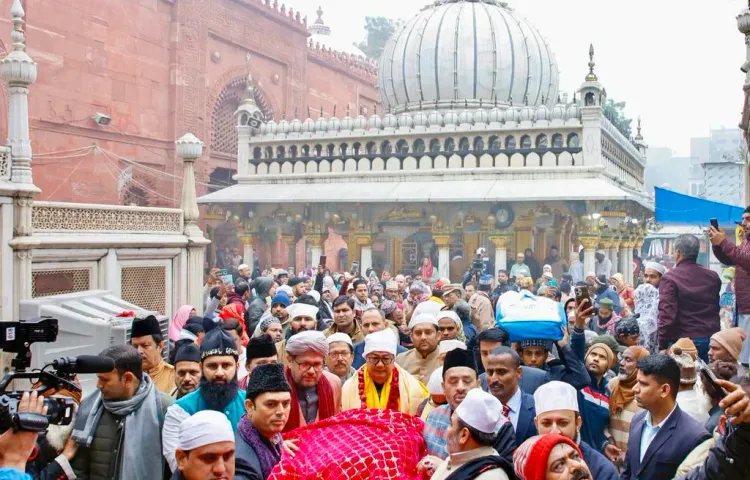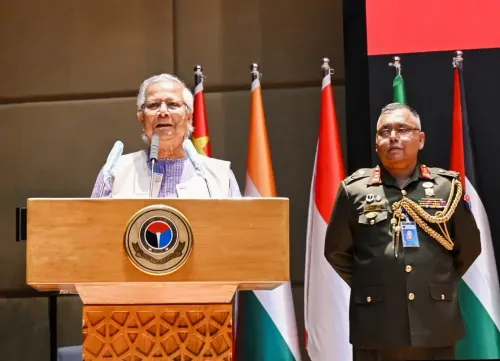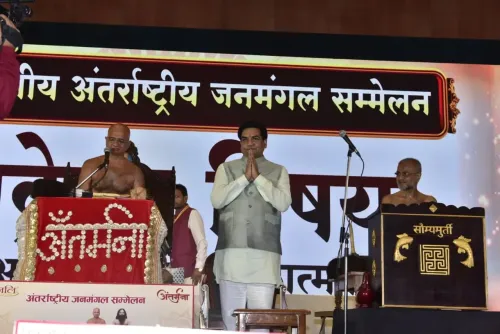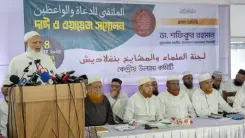Will the Final Hearing in the Ajmer Dargah Dispute Change History?

Synopsis
Key Takeaways
- The Ajmer Dargah dispute is a significant legal and cultural battle.
- Both sides are presenting final arguments in court today.
- Vishnu Gupta claims the Dargah is built on a Hindu temple site.
- Architectural features are central to the arguments.
- The outcome could reshape historical narratives.
Ajmer, July 19 (NationPress) The concluding hearing in the much-discussed Ajmer Dargah dispute case is scheduled for today at the Ajmer Civil Court, where both parties are set to deliver their final arguments.
The court is anticipated to assess the viability of the petition submitted by Hindu Sena National President Vishnu Gupta, who argues that this esteemed Sufi shrine was erected on the ruins of a Hindu temple.
During the previous session on May 31, the court hinted it would determine the legal sustainability of Gupta's petition.
Prior to this, Gupta submitted a request for a stay to prevent government agencies from presenting chadar at the Dargah.
In response, the Ministry of Minority Affairs and the Archaeological Survey of India (ASI) submitted their responses to the court.
The dispute originates from Gupta's petition, which claims that the Ajmer Dargah is built over the original site of a Hindu temple dedicated to Lord Shiva.
In reaction, the Dargah Committee has filed a motion to have the case dismissed. Additionally, the Anjuman Committee, linked with the Dargah, has approached the Rajasthan High Court regarding the issue.
Gupta's claims are based on three primary arguments. He asserts that the architectural features of the Buland Darwaza within the Dargah complex closely resemble those of Hindu temples, especially in terms of its intricate carvings and decorations.
He also highlights remnants that resemble temple structures in the domes and upper areas of the shrine. Furthermore, Gupta contends that the site includes water features typically linked to traditional Shiva temples, reinforcing his assertion that this location was once the Sankat Mochan Mahadev Mandir.
Gupta asserts he is ready to present a Sanskrit manuscript titled 'Prithviraj Vijay', dated 1250 AD, along with its Hindi translation, which he claims contains significant references to Ajmer's religious heritage.
Additionally, he has referenced arguments by attorney Varun Kumar Sena in the Supreme Court, arguing that the Places of Worship (Special Provisions) Act does not pertain to the Ajmer Dargah, as it is a religious site that falls outside the Act's jurisdiction.
Security measures for Gupta have been implemented under the guidance of Superintendent of Police Vandita Rana, following an official request from the petitioner.
The Ajmer Civil Court accepted the petition on November 27, 2024, subsequently issuing notifications to the Ministry of Minority Affairs, the Dargah Committee, and the ASI.
Various individuals have submitted applications to join the proceedings, including the Anjuman Committee, Dargah Diwan Ghulam Dastagir (Ajmer), A. Imran from Bengaluru, and Raj Jain from Hoshiarpur, Punjab.
Gupta also pointed out a publication from 1911, Ajmer: Historical and Descriptive, authored by retired judge Harbilas Sarda, which reportedly mentions the use of debris from a Hindu temple in the construction of the Dargah.
The petition also suggests that a Jain temple may have previously existed within the sanctum sanctorum of the site.










